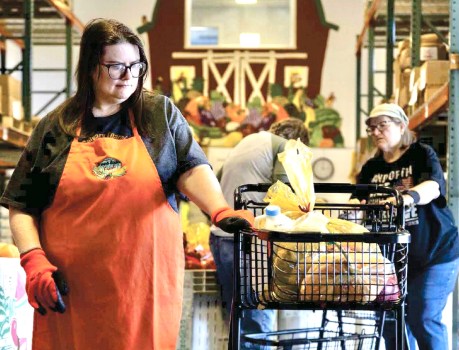Editor’s Notebook We must fight on behalf of freedom from want
Published 9:53 am Tuesday, April 29, 2025
The Great Depression had soup lines. We have food banks.
There are, of course, glaring differences between the 1930s and now. Mass job losses were the curse of the Depression. Today, for the moment, most Americans who want a job can find one. Even so, donated food is indispensable for one out of every six or seven people in the country. All too often, full-time work doesn’t pay enough to fully cover a family’s expenses. Children, the elderly and disabled rely most of all on hunger-relief programs.
Another difference with the Depression: Few today grow our own nourishment. A century ago about a third of us lived on farms, and many more at least had vegetable gardens, orchards, backyard chickens and other forms of self-reliance. Canning and other preservation methods extended homegrown nutrition far beyond the growing season.
Half a century ago in the 1960s, my grandfather observed that most townfolk think “chicken” is a product manufactured in a backroom at the grocery store, complete with the clear plastic wrapper. Today, we’re even further removed from understanding the realities of food production and distribution.
Our ignorance extends to the ways in which farmers support food banks, in the form of donations and food purchased by the federal Commodity Credit Corporation (CCC) for distribution to the hungry. It is — and we hope will continue to be — a system ensuring decent meals for many hundreds of families in our Lower Columbia River communities.
Food bank budgets left to rot
The U.S. Department of Agriculture’s abrupt cancellation of funds for regional food-distribution networks is spoiling budgets that were already hard pressed to keep up with demand. Federal budget slashing threatens to reduce food deliveries by about one-fifth, just as skyhigh tariffs and other factors raise the cost of living for working families — who need a bigger boost to get by, not less.
“Right now, some of the richest and most powerful men in the world are stealing food from our kids,” Washington state U.S. Sen. Patty Murray said at an April 10 news conference.
“[T]aking away the most basic human rights, food, from Oregonians, who are already impacted by high rates of hunger and food insecurity,” the Oregon Food Bank Network told the Astorian.
Leaving the hungry unfed is an insult to national pride — even the ancient Roman emperors tried to make sure their people had enough to eat.
We all should speak up in support of food banks, our neighbors who they help feed, and the farmers whose economic survival depends, in part, on longstanding federal purchases of produce and other ag products.
“We put these seeds in the ground, and it’s months before we harvest them,” an Olympic Peninsula farmer told a reporter this month. “We need to know where they are going. Losing these markets [food banks] is a really big blow to us right as our costs are rising.”
Freedom from want
I know how lucky my siblings, cousins and I were to grow up without scarcity. If we were hungry, it’s because we were so busy getting into innocent trouble that we forgot to eat. The same mostly goes for my mom and her brothers, who grew up on their parents’ ranches in the Depression. They never had money but always had enough to eat.
In this time when we’ve scrapped USAID assistance for the genuinely starving poor abroad, cast aside decades of support for our own food banks, and left American farmers in the lurch, we must stand up in proud support of the freedoms described by President Franklin Roosevelt in his 1941 address to Congress, particularly “freedom from want — which, translated into world terms, means economic understandings which will secure to every nation a healthy peacetime life for its inhabitants — everywhere in the world.”
FDR understood, as we all should, that a rising tide lifts all boats. Universal prosperity may be out of reach, but at little cost we can still alleviate outright suffering. To turn away is both immoral and self-defeating, recreating conditions that lead to depressions and wars.
How many Americans today can realistically produce much of our own food as our grandparents did? We might want to start thinking about it.





